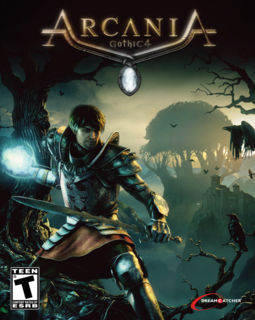Arcania offers qualities that can be appreciated by any Gothic fan who's willing to forgive.
What made Gothic games special was the fact that they had both high quality in terms of their whole design and traits of a true cult title. Arcania basically takes both things and makes them inferior without compensating. Basically throws everything that made Gothic games special in to trash can and replaces them with real trash. Elements that avoiding them made Gothic, Gothic in the first place. Although ignoring the fact that this is a Gothic sequel, ( as hard as it might be ), there's an addictive and sometimes, delightful experience to be had with Arcania. Especially if it's judged by the standards set by single-player RPGs these days.
Arcania's story is a bit neutral. It hardly becomes interesting, but it's not something you can totally ignore too.
It's the story of a simple shepard in the island of Feshyr ready to get married to a girl he really likes, but for an unknown reason (yet ), his island gets
attacked and all of his friends and his future wife die. Angry by the incident, he decides to kill Rhobar III ( Nameless hero from previous Gothics who has gone mad by a cursed amulet ) who he thinks is behind the attack. His first step ( given to him by Diego, helpful NPC of the series ) is to find a powerful magical anvil and preventing the king's forces getting their hands on it.
Overall, two things that I really liked about the story were:
1. Faithful character development for the characters from previous games.
2. The fact that everything, big or small, major or minor, is well explained in the game.
Except for the cliff hanger ending, every story detail is well placed and all the questions and obscurities are answered. If a character gives you a task, you can ask why he/she doesn't do it him/herself and he/she always gives a fairly convenient answer. Although main story goes downhill when Xesha ( main villain which is very lame for a Gothic game ) and her minions are introduced, but other than that, everything else is standard.
Arcania's biggest mistake is throwing away Learning Points and tutors in Gothic 1-3 and replacing it with the overused and unexciting skill points. Every time you level-up, you get three skill points and you can spend them right away on 8 different sets of skills. ( 3 melee, 1 ranged weapon, 1 sneaking, 3 magic )
Increasing every skill increases basic abilities dedicated to it. Melee/ranged/magic power, health/mana regeneration ( Yes, there is health regeneration ) but each one has a point where you get a new ability for your skill. Fortunately, new abilities make a difference and they usually refresh
your motivation for continuing the game and fighting enemies. But your real power is determined by your equipment, levelling up only determines which
path you choose. ( warrior, rogue or mage ).
Combat in Gothic 4 leaves a very bad impression at first. It seems tasteless and uninvolving. But after you get the right abilities and get to the right enemies, it will be a blast. Throwing a fireball between a group of badass skeletons or snappers who'll kill you with three hits if they get the chance and seeing them burn while you're charging another one never gets old.
Unfortunately, faction choosing and freedom of choice with actual consequences are gone in Arcania. ( like many things ) There are a couple of quests which give you two or three options for completing them, ( like which of the brothers you're gonna help to be the baron of Stewark ) and a bit of dialogue and a one or two rewards are changed, but other than that, these choices are just there to fill the void and have no notable significance.
Gothic games are usually famous for their brutal world. Hard and slow starts. Gothic 4 ( if played on the highest difficulty ) never pushes you beyond your
limits like those games did, but it always give you certain amount of challenge from start to finish and if you don't use potions and elixirs which make you ridiculously strong, you can always except to die every now and then. ( which is an essential thing for a Gothic game. ) Overall, Arcania would have been more challenging if it wasn't for the rolling thing which makes it
a piece of cake to dodge hits,
Definitely the best part about Arcania is its visuals. It offers easily some of the most beautiful scenery , draw distance and shadow effects I have ever seen in any game. Unfortunately, even the best part of the game is shadowed by a mistake. Rain. Every time it rains in the game's world, all of the beauty is replaced by a foggy, ugly world and unfortunately, raining happens a lot. Arcania would have been a more pleasant experience if the weather was always sunny. ( As weird as that might sound.)
In terms of audio department, Arcania is a disappointment. There's nothing special about the game's music and it's just something you hear in the background. ( As oppose to the epic and beautiful score in the previous Gothic which added to the experience. ) Voice acting, as expected, is average except for the main character, Diego, Zyra and Gorn.
Overall, Arcania offers around 30 hours of game-play and at least half of that time is great entertainment judging by today's standards. It might not be comparable to its predecessors, but Arcania is far from being bad. It's not a hit or miss title. Obviously, it has been made with the hope of success and there are signs that show effort and passion has been put into making it. But trying to be great is not enough for a Gothic sequel.

